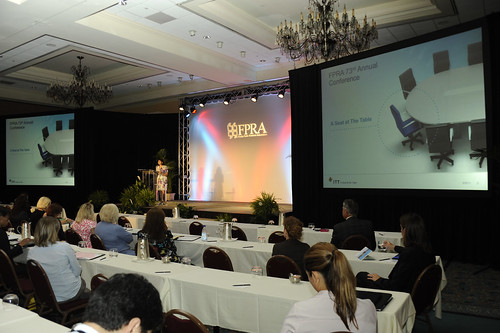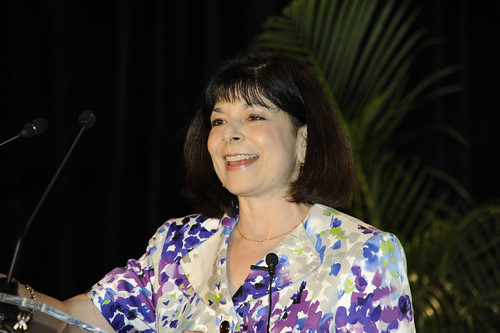

Do you have purpose and passion for what you do? Do you have a seat at the table? Angela Buonocore has more than 32 years experience in communications for major corporations and is still excited to wake up in the morning and go to work every day. She says we should all feel that way – the PR profession is extremely exciting and that’s why we’ve chosen it.
The lessons Angela shared with us today can be applied wherever you are in the organization, although your goal should be to work for the CEO.
She says, “If you’re not working for the CEO now, I hope it is your goal to do that. I always wanted to sit in the executive suite.”
When she started her career In 1979, that was a pipe dream, but women have come a long way. As communications professionals, we have to strive to sit in the executive offices at the round table.
So how do you earn your seat at that table?
First, Angela shared a bit of history about ITT Corporation and the equity in the brand. She joined in 2007 after her tenure at Pepsi and is thrilled about this job and the diversity of products from pumps to break pads for cars, high-speed trains and more.
In January 2011, ITT announced they are splitting into three. This has been a most interesting experience and she is proud of how she and her PR team used the history news hook to enhance the story. The firm’s history of splitting businesses and making them work became the story.
Other companies have since announced splits, but ITT is mentioned in every story. Angela is delighted about starting the trend.
Her road to the top provides her with the credibility to tell us about achieving a seat at the table. During the 30+ years, she has been a student of what works – not just when it comes to communications.
Angela’s advice?
If you find something you love, stick with it.
From the beginning, Angela has been a viewer of tables and seating arrangements. When you join a company, first become a good observer of how things work because they don’t work the same way in any two companies. Ask questions, interrogate.
Her mother used to say, “Here comes the questioner.”
Once she asks questions to several different parties, she triangulates the information.
As communicators, many of us with journalism backgrounds, we are the best detectives. Understand the who, what, when, why, where – apply what you’ve learned and figure out how you get ahead.
Gather your information but don’t hoard it. She used to love hoarding it because Knowledge is Power. But it’s important to share what you learn – you get satisfaction, help build teams, and later on you may need help doing something.
If you haven’t been a player on a team, people don’t share with you.
What influences the function’s seat? How well is the function perceived? In a company you have to look at where communications sits. It doesn’t always have to report to the CEO, but if it does, you know he/she thinks it’s just as important as accounting, manufacturing, all high levels of the organization.
Understand the responsibilities – how well do we establish vision and direction? Both in the division in which we work, and in the more elevated version as the lynchpin in developing the company.
How does the CEO tell the same consistent message that will resonate with different constituencies – shareholders and employees alike. How do you deliver those messages? ITT’s CEO looks to Angela to do that and we must ask ourselves these questions.
Focus & Results
An important characteristic is the drive for results. Getting the results is critical.
Like Pepsi, you have to be focused on the big win. How do you get it done?
You must also know what the CEO is thinking when it concerns the big win – he/she is not thinking of the big news release. The CEO is thinking about the money, money, money. What is the ROI? If our function is thought of as overhead, we better show results.
Angela always asks her team, “How are these communications objectives going to drive the business?” If you can’t answer that, it’s problematic.
A great communicator has to be a great businessperson. And the very first thing you have to do is learn as much as you can about that business.
Ability to drive changes
We need to look and see what needs to be changed – and what doesn’t. There is always opportunity for continuous improvement.
For people who drive change, communicators have the skills. Words are very powerful – if they are delivered in the right way, they can inspire, put fear into people, or incent people to change things. It’s not just explaining what we have to do, they want to understand why – what is the rationale?
Sometimes people at the top lose touch with the people running the business – meeting with customers, manufacturing. Angela makes sure she is in the field, on the factory line – always engaging employees and learning about their concerns.
Get out where people make things, sell things. Nothing happens at a company until people sell things. What are we doing to help sales people and manufacturing people?
Skills of the leader, skills of the team
A head of HR once told Angela, “You will be judged as to how good of a leader you are – by whom you hire and whom you fire.”
Lots of leaders and managers cannot step up. The most satisfying aspect is to take someone who is not performing and make him or her perform. But if that’s not possible, you have to be able to make crucial decisions.
Now on the other side of chart:
Results from left will drive the right side of chart. What does everyone else think about what you are doing? Angela cares about respect for herself and for her team – she wants her function to be thought of highly by inside and outside constituencies. How to do these things better?
How do we earn our seat? We have our own value systems –we don’t all carry the same set. You want your individual values to match the corporate values. What does the company value most and does that fit with what I value?
Treat employees well to serve your shareholders well. You have to know how to ask those questions. Big reasons why people fail – usually their values don’t align with where they are working, or they have not aligned other people.
Connection to and understanding of the business. Surprisingly a lot of people don’t bother to do it – the more you can demonstrate you understand, the more leaders will respect.
Strong communication skills – this is not a throwaway. Some people, communications professionals, send Angela letters and resumes with mistakes. Read your work over.
Hardest one to measure – the ability to make magic. The talent to put all the ingredients together.
What matters the most?
Three things:
*Masters of complexity – deep technical skills. People who can read between the lines, connect the dots – it’s hard to teach people how to do that.
*High impact leadership – sought for advice and counsel. Get out and see who is the natural leader.
Influences other people’s thinking
Sense of urgency, but not reactionary
Don’t always look like your hair is on fire – people want to see you cool, calm and collected – even when you’re not
Great follow up – don’t miss the details. People will say:
“She has a strong leadership presence”
“Wise beyond her years.”
“That person fills up a room.”
*Consistent results – day in, day out, year in, year out
Build a plan, work the plan
People are confident when they give you something to do.
People will say:
“She always delivers.”
Top three reasons communicators fail to realize their full potential:
*Skills not equivalent with scope of job – if job is too big, they can fail. Can’t communicate strategy until you know business strategy. Develop relationships with internal customers and peers.
People get defensive and lose confidence
No “fingerprints”
*Good but not great is not good in a high performance company. What happens to people who are good but not great? They get eliminated.
They allow themselves to get in a comfort zone where they have inflated opinion of their work instead of trying to make the work better. Not viewed as a thought leader. Don’t look at big picture. Then tactical will outweigh the strategic – and this is the kiss of death.
*Good year, bad year – too inconsistent. Raise the bar. Gets comfortable, doesn’t challenge. Good becomes good enough.
Four ways you can take your seat and keep your seat.
*Gift of feedback
Ask for it – develop five sources for well-rounded picture of what it is you do well (and not so well). Your boss, internal customers, one of your peers, external source, other team members. Collect feedback as often as you like and compare. Be specific in how to get feedback. Ask boss for respect, candor, sincerity, follow up.
*Calling your shot
Shows you are in control
Have risk orientation
Demonstrates self confidence
Requires clarity of purpose
Helps us measure your success
Takes luck out of play
*Break out of the pack
Results are the foundation
Good at everything
Great at something: Be the best at something, shape stories, create engagement, understanding company
You need purpose and you need passion!
Most important takeaways:
Great Results
Strong Business Partner
Thought Leader
Success against higher bar – you set the bar:
No comfort zone
Be very proactive
Never completely satisfied
Do you have a seat at the table? And if you do, are you comfortable in it?
Link to PR Week Story to see what the ITT Chairman says about Angela:
http://bit.ly/n2uQ6K
More about Angela A. Buonocore
From the ITT Website (www.itt.com)
Senior Vice President and Chief Communications Officer
Angela Buonocore is Senior Vice President and Chief Communications Officer for ITT Corporation. In this role, she is a member of the company’s Strategic Council and is responsible for global brand and reputation management, public relations, employee communications, corporate advertising, community relations and corporate philanthropy.
She joined ITT in March 2007 from The Pepsi Bottling Group where she served as Vice President, Corporate Communications since 2001. In this role, she was responsible for the group’s public relations objectives and strategy, communication with the organization’s more than 60,000 employees and charitable initiatives. Prior to her 12-year career in the PepsiCo system, Buonocore spent 11 years with IBM and five years at General Electric Company in various internal and external communications roles.
Buonocore is a trustee of the Arthur W. Page Society and the Institute for Public Relations, and a member of the Wisemen and the Seminar, all organizations of senior corporate communications executives. In 2003, she was elected a member of the Accademia Europea per le Relazioni Econimiche e Culturali, a Rome-based organization that honors Italians and Italian-Americans who are leaders in their fields. In 2010, she was honored by the National Organization for Women’s New York City chapter as a Woman of Power and Influence.
Buonocore holds a Bachelor of Science degree in Advertising with High Honors from the University of Florida and was honored as a Distinguished Alumna of the College of Journalism and Communications in May 2007.
